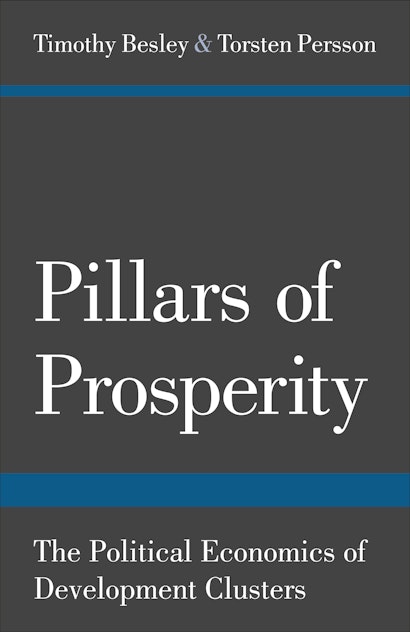“Little else is required to carry a state to the highest degree of opulence from the lowest barbarism, but peace, easy taxes, and a tolerable administration of justice; all the rest being brought about by the natural course of things.” So wrote Adam Smith a quarter of a millennium ago. Using the tools of modern political economics and combining economic theory with a bird’s-eye view of the data, this book reinterprets Smith’s pillars of prosperity to explain the existence of development clusters—places that tend to combine effective state institutions, the absence of political violence, and high per-capita incomes.
To achieve peace, the authors stress the avoidance of repressive government and civil conflict. Easy taxes, they argue, refers not to low taxes, but a tax system with widespread compliance that collects taxes at a reasonable cost from a broad base, like income. And a tolerable administration of justice is about legal infrastructure that can support the enforcement of contracts and property rights in line with the rule of law. The authors show that countries tend to enjoy all three pillars of prosperity when they have evolved cohesive political institutions that promote common interests, guaranteeing the provision of public goods. In line with much historical research, international conflict has also been an important force behind effective states by fostering common interests. The absence of common interests and/or cohesive political institutions can explain the existence of very different development clusters in fragile states that are plagued by poverty, violence, and weak state capacity.
Awards and Recognition
- Honorable Mention for the 2011 PROSE Award in Economics,s, Association of American Publishers
Timothy Besley is the School Professor of Economics and Political Science at the London School of Economics and Political Science. Torsten Persson is the Torsten and Ragnar Söderberg Chair in Economic Sciences and professor of economics at the Institute for International Economic Studies, Stockholm University.
"This is a fascinating set of questions, and Pillars of Prosperity will be essential reading for other researchers in this area."—Diane Coyle, Enlightened Economist
"Besley and Persson have written a book that seeks to bring weak and fragile states into mainstream economic analysis. . . . [I]f you wish to model the fiscal capacity of various nations, or their legal capacity, or political violence . . . this is an ideal place to start. . . . This is a marvelous book."—Daniel Bromley, American Journal of Agricultural Economics
"This book is a must-read for any serious student of development economics and political economy. Besley and Persson provide a rich framework for understanding the evolution of economic, legal, and political institutions, and rightly place the state at its center. Their emphasis on fiscal and legal capacity and political violence is particularly apt. This work will inspire, motivate, and challenge many generations of researchers and students."—Daron Acemoglu, Massachusetts Institute of Technology
"Pillars of Prosperity is a landmark analysis of political economy. It provides the first rigorous foundations for the emergence of the effective states needed for development. In the process, this book opens many paths for new research."—Paul Collier, Centre for the Study of African Economies, University of Oxford
"For much of the poor world, economic development is not about resources but about state capacity. Without an understanding of what makes an effective state, aid is as likely to harm as to help, and millions are doomed to cycles of poverty and violence. In Pillars of Prosperity, two of the world's leading political economists bring together the economics and politics of development. This book will fundamentally reshape debates about global poverty and foreign aid."—Angus Deaton, Princeton University
"Why are some countries rich and peaceful while others are poor and prone to political violence? This book is an ambitious attempt to cut theoretically into the Gordian knots of reciprocal causation that make progress on answering this question so hard won. Besley and Persson develop an original approach to examining state decisions to develop fiscal and legal capacity, along with decisions bearing on political repression and violence, within a single theoretical framework."—James Fearon, Stanford University
"With an elegant and sophisticated series of models, this book illuminates the processes that cause prosperity and political order to develop together. Offering powerful insights into the divergent paths countries have taken, it is a major contribution to the fields of political economy and development economics."—Daniel Treisman, author of The Return: Russia's Journey from Gorbachev to Medvedev


